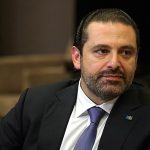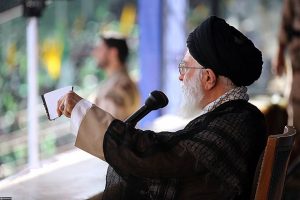By Ghassan Michel Rubeiz
It is great news for Lebanon that Prime Minister Saad Hariri has resigned. At this decisive moment, the undeclared leaders of the uprising must pause and weigh alternatives. A secular identity is emerging in the October 17 rebellion with people rushing to the street to oust a political class. In thirteen days an Arab Spring-like movement forced the prime minister to quit. The suffering is clear: a ballooning national debt, high unemployment, regressive taxes, inflation and widening poverty. Hariri had been aware that the entire economic system is about to collapse on his watch. It would be a mistake for the president to re-designate him to form a new cabinet.
The future is exciting but also very risky. October 29 could be the start of a programmed process of political reforms. Or, sadly, this date could be the mark of political vacuum exploited by political parties and invisible external hands.
There are at least three powerful political parties that could either overreact or try to exploit the uprising: Hezbollah, the party of President Michele Aoun—the Free Patriotic Movement (FPM)—and the Lebanese Forces (LF). Among these three parties, Hezbollah is the most powerful, being backed by an armed militia. Many consider Hezbollah and FPM the “ruling” regime. The FPM has failed to live up to its promises through its founder President Aoun, and his son-in-law and foreign minister Gebran Bassil. Bassil is perhaps the most criticized politician in the country. The strategic and artificial partnership between the FPM and Hezbollah will be strained or broken if Hezbollah takes an offensive approach in trying to defeat the uprising. Hezbollah would also risk going into a deep downward spiral if it uses its arms locally.
Hezbollah considers the October 17 uprising to be a “sincere” initiative but too “disruptive.” Some of its supporters have conducted attacks of intimidation on several demonstration camps over the past week. The national army had to intervene to prevent escalation of tension. But Hezbollah is too smart to respond more aggressively to an uprising which has instantly gained popularity.
Hezbollah was closely associated with nine months of negotiations in the forming of Hariri’s government nearly two years ago. The choice of a weak prime minister and a compliant president suited the complicated interests of Hezbollah. The next cabinet will take too long to form if Hezbollah decides to resist a threatening post-intifada government.
At this critical point in time, the future of the uprising largely depends on how Hezbollah reacts to the uprising’s bold demands, beyond cabinet change. Demonstrators call for a credible government of technocrats and the dissolution of parliament. The uprising also demands the end of the confessional system of power-sharing. Is the nation ready for such level of reform?
The leaders of this uprising are aware that the economic system is about to collapse if adequate measures are not taken swiftly. The uprising must also realize that to reach a secular political order requires new socialization and changing of deep-rooted religious structures.
It is not easy to secularize a culture if its religious institutions are too rigid. Then there is the necessity of building trust in secular politics. In a secular electoral system, Christian politicians will lose the privilege of a guaranteed share (of fifty-percent) of the parliament and cabinet ministers, not to mention a designated presidency, as well as a chief of national armed forces. At a later stage, Hezbollah might try to compete for political positions on a secular basis. Its large Shiite constituency would allow Hezbollah more seats in the parliament. But is Hezbollah now willing to relinquish its political influence on the overall political system, a privilege which comes with a “license” to run a militia and to engage freely in cross border wars? With a sharp focus on Israel, Hezbollah has become a regional movement based in Lebanon, a structure which critics consider as a “state within a state.”
The upheaval in Lebanon could not have happened at a worse time from Hezbollah’s perspective. It is under increasing pressure from the U.S. and Israel; the former is imposing additional sanctions and the latter is conducting air attacks. There are pressing circumstances for a war between the Iran-Syria-Hezbollah axis and the Israeli-Saudi-U.S. coalition. The future of Syria, where Hezbollah is heavily invested, is still unknown. The fate of the Syrian and Palestinian refugees in Lebanon is undetermined. And Iran, Hezbollah’s main external supporter, is under severe U.S. sanctions. As a result, Hezbollah now does not seem to be ready to abandon its regional commitment in return for better representation in an unpredictable future political order at home.
But Hezbollah may have overplayed its hand in threatening the uprising with civil war.The legitimacy of the Lebanese uprising needs no validation. It is a historic awakening for being non-sectarian, non-partisan and very popular.
Nonetheless, the uprising must listen carefully to Hezbollah’s subtle cues for reaching a compromise. The protestors must not forget that they have severe local and regional limitations by being neighbors to Syria and to Israel, two states in a conflict of survival. The presence of over a million Syrian and four hundred thousand Palestinian refugees signifies that whatever takes place in Beirut, if significant, it is bound to have an echo in Damascus and in Tel-Aviv. And often these two capitals squeeze Lebanon hard.
The uprising would do well to concentrate on participating in the choice of a new prime minister and the formation of a small, experienced and dedicated cabinet. Priority must be given to developmental, banking and financial solutions. Lydia Assouad, a Lebanese Carnegie scholar, offers a valuable opinion on urgent economic reforms:
“Regarding economic changes, the state’s mismanagement has allowed a wide margin for measures and reforms that could ease the situation and raise revenues, even within the current budget. These could include a partial cancellation of the debt held by domestic banks and a reduction in the interest rates on previous debt, as well as compelling banks to loan to the state at zero percent interest for one to three years; introducing a progressive income tax as well as a capital gains tax; and investing heavily in infrastructure.”
It would be smart to negotiate with the president over the possibility of scheduling early parliamentary elections. But the timing of the new parliament election must not be a deal-breaker, given the urgency of cabinet formation. A day after Hariri’s resignation, Aoun acknowledged the noble efforts of the uprising. “Lebanon will have a clean government and the protests that happened have opened the door to major reform,” he said, waring, “Should obstacles arise in our way, the people will return anew to the squares.”And on the issue of moving to a totally secular electoral order, it is necessary first to introduce changes in the laws regulating marriage, gender, sexuality and freedom of religion. Such legislative changes in personal statues will take time to achieve, given the fact that clerical authorities in Lebanon are a co-opted autocracy.
The uprising is credible and on the right track but it is not organized enough to stand opposition or manipulation. The rebellion has already revealed impressive facts. The country seems more united over secular objectives. Returning some stolen funds from extremely exploitative politicians is possible. There is a consensus that the policies of the central bank should be altered to serve the people first, not politicians who are in partnership with banks. The local banks are under pressure to participate significantly in reducing the national debt. A list of urgent reforms in public service (especially electricity, water and telecommunication) has been identified.
The uprising could hold the new government accountable for achieving progress with quantitative benchmarks, monitor progress and continue organized public pressure, without civil disruption. The uprising could come back to the street in the future, if necessary, having gained plenty of moral power in a short period of time. A graduated plan of secularization of society and the political order may need a national task force. A well studied secularization plan could be subjected to a referendum before receiving official approval.
The uprising must not risk losing its achieved moral and political power by risky overreaching. And Hezbollah must act magnanimously and work with all groups to turn a crisis into an opportunity.
Ghassan Rubeiz is an Arab-American writer, journalist, and commentator on issues of development, peace, and justice. He is the former Middle East Secretary of the Geneva-based World Council of Churches.





The balance in Lebanon has always been fragile as strong forces are side by side. Sunni emboldened by Saudi Arabia and the C.I.A. are mostly focused on crushing Hezbollah in behalf of Israel, Hezbollah of course being the armed branch of majority Shi’ite segment, and Christians having historic and valuable roots in the country. But behind these religious façade, what unifies the revolt is first of all the rampant corruption of the elites, and this is common with most of the revolts firing around the world. The leaders, including Hezbollah, who first identify with the changes in coping with inequality will be the winners.But they need to gain first the necessary credibility which is paramount in this kind of battle..